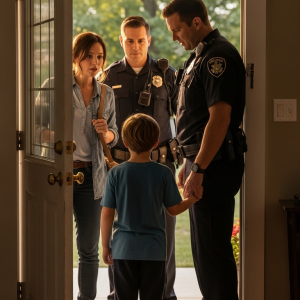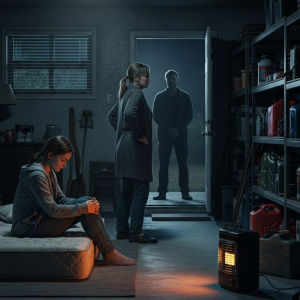It was a quiet Saturday night, the kind we’d had a thousand times over seven years of marriage. After dinner, my wife settled into the den with her shows. I drifted between the Spurs game on TV and a few odd jobs I’d been putting off, a comfortable rhythm to end the week.
Before I knew it, she was two bottles of wine deep. Around midnight, I went to check on her and found her passed out on the couch. I leaned in to scoop her up, to carry her to bed like I always did, when the screen of her smartwatch buzzed to life on her wrist.
A message glowed in the dark. “I can’t do that. My husband would lose his mind.” I froze. What the hell was that? My curiosity got the better of me. I gently tapped the notification, my thumb brushing against her skin. The screen opened to a conversation between my wife and a so-called friend of mine.
We called him “Jacket Holder.” A nickname from our teenage years because whenever a fight broke out, he was the one standing on the sidelines, holding everyone’s jackets. Never in the mix, always on the edge. I scrolled up, my heart pounding a sick rhythm against my ribs. It looked like he had contacted her first, with flirtatious messages and winking emojis. It was inappropriate, but not a smoking gun.
Then I got to the messages from that night. Fueled by wine, her words were a desperate plea. “I’ve always wanted you,” she wrote. “No one would ever have to find out. We could just… see what happens.” Then came the line that shattered everything, the one that felt like a dagger twisting in my gut.
“Besides,” she’d typed, “I’m great at keeping secrets.”
I tried to keep scrolling, but there was nothing else. I didn’t know her phone passcode. My hands were shaking as I carefully lifted her and carried her to bed. I laid her down, her breathing peaceful and oblivious. I, on the other hand, spent the rest of the night in the kitchen, staring into the darkness, a chasm of shock opening up inside me.
My alarm went off at 5:30 AM. I walked out to my work van, the morning air cold and sharp, but I couldn’t bring myself to start the engine. The weight of it all hit me. I slumped against the steering wheel, the cold plastic a stark contrast to the fire raging in my chest. Facing work, facing people, facing the day… it was impossible.
I went back inside, grabbed a half-empty bottle of vodka from the cabinet, and topped it off with Coke. Our house backs onto miles of woodland and a disused railway line. I just started walking, with no destination in mind, the crunch of gravel under my feet the only sound besides the blood roaring in my ears.
I ended up under a graffiti-covered railway bridge, feeling like a troll hiding from the world. The steam coming from my ears could have been seen from a mile away. What do I do? The thought of speaking to her, of even looking at her, made me physically sick. Every ounce of love I ever felt had evaporated, replaced by a profound sense of disgust.
That one line—“I’m great at keeping secrets”—echoed in my head. It wasn’t just about this one time. It reeked of practice, of a hidden life I knew nothing about. Who was this woman I had shared my bed with for seven years? I felt betrayed, not just as a partner, but as a person. She had made me feel like a fool.
The house we live in belongs to my parents. They moved to a retirement village six years ago and let us move in. It will be mine one day, so at least I knew she couldn’t take it in a divorce. The thought was a small, cold comfort in the storm. My first instinct was childish but deeply satisfying: change the locks while she’s out and lock her out for good.
As for Jacket Holder… he was no longer just the guy holding the jackets. He was about to be holding his face.
A pair of dog walkers found me under the bridge. An older woman with kind eyes looked at the bottle in my hand and said, “Son, the worst thing you can do right now is drink. It will only cause carnage.” Her words cut through the fog. I thanked her, threw the bottle away, and called a friend. He wasn’t home, but he told me where to find his spare key.
I spent the day on his couch, ignoring the flurry of texts and calls from my wife. “Where are you? Your van is still here!” I texted back a simple lie about engine trouble. She seemed to buy it. When my friend came home from work, I told him everything. He advised me to keep a low profile, see what else I could find, and talk to a lawyer immediately.
I went home around six, exhausted to my bones. The adrenaline that had fueled me all day had vanished, leaving a deep, aching fatigue. The moment I walked through the door, I knew she suspected something. She was on me instantly, peppering me with questions about my day.
“You left your lunch bag in the van,” she said, her arms crossed. “Something’s been up all day. I can feel it.”
I was too tired for a charade. “You’re right,” I said, my voice flat. “Something is up. Last night, while I was putting you to bed, a message popped up on your watch. I read it. I read all of it.” I met her gaze, letting the silence hang in the air. “You’re a disgusting, cheating liar, and I want nothing more to do with you.”
The change was instantaneous. Her crossed arms fell to her sides, the defiant posture melting away. Her face, once a mask of authority, crumpled into that of a terrified child caught in a lie. “Great at keeping secrets, are you?” I sneered. “Begging that little rat for a good time?”
The sobbing started, followed by a torrent of predictable excuses. “I was drunk! I was vulnerable! It didn’t mean anything, I swear!” It was like she was reading from a cheater’s playbook. “He messaged me first! I was never going to go through with it!” The only thing she didn’t do was blame me. She knew that would have been the final line.
I walked past her and went upstairs. “I want a divorce,” I called down, the words tasting like ash. “And I want you out of this house within a month. You’re sleeping in the spare room starting tonight.” When I came out of the shower, she was sitting on the top stair, still crying. I just shook my head and walked past her, the sound of her waffling nonsense fading behind me.
I thought getting her out would be the easy part. I was wrong. I told my parents what happened, expecting support, a righteous anger on my behalf. Instead, my mother was adamant. “You are not throwing that poor girl out onto the streets,” she declared.
She and my wife had always been close. My mother saw her as the daughter she never had. “She made a mistake, a terrible one,” my mother argued, “but you sort it out like adults. You’ve been through too much to throw it all away over words on a screen. She didn’t actually do anything.”
Her words hit me harder than my wife’s betrayal. She was taking her side. My own mother. I couldn’t believe it. This complicated everything. Did I even have the right to ask my wife to leave if my own mother, the owner of the house, was against it? I wasn’t leaving; I had done nothing wrong. This was turning into a nightmare.
I booked an appointment with a divorce lawyer for the following week. Until then, I was trapped, living with a ghost in a house that no longer felt like home. I knew she wouldn’t admit to anything else now. I’d never know if she was a masterful liar or if this was a one-time, drunken mistake. Honestly, it didn’t matter. The trust was gone forever.
The next twenty days were a special kind of hell. It became clear she had no intention of leaving. With my mother in her corner, she felt secure. The house became a dead zone. The living room turned into a No Man’s Land, a silent, empty space we both avoided. We were ghosts haunting opposite ends of a hallway.
I started working late, doing anything to avoid interaction. At first, I ignored her completely, but the silence was corrosive. I started feeling like the villain. I switched tactics, adopting a civil but cold demeanor. It was better, but the toxicity remained. One night, I found her crying on the bathroom floor. Instinct took over; I helped her up and gave her a stiff, awkward hug. A part of me screamed that it was a performance, a calculated act to gain sympathy. That’s what this environment did—it poisoned every thought.
She kept saying she would do “anything” to save our marriage. So, I decided to call her bluff. “Fine,” I said one evening. “Take a lie detector test.” I had no intention of actually doing it; I just wanted to see her reaction.
Her eyes widened. “Of course! I’ll do it. I have nothing to hide.” For a moment, a sliver of doubt entered my mind. A few hours later, she came to me, tablet in hand. “I’ve been reading about them,” she began, her voice strained. “They’re incredibly inaccurate. My anxiety disorder would create false positives. It wouldn’t be reliable.”
A laugh escaped my lips. It started as a dark cackle and ended in a childish giggle. So she would do “anything” to save the marriage—anything except take a lie detector test. It didn’t matter. As I told her, “I don’t see my wife anymore. I see trash that needs to be taken out before it stinks up the place.”
Meanwhile, Jacket Holder became the talk of our friend group. I had exposed him for the rat he was. He was completely ostracized, his calls blocked. I hoped his moment of flirtation was worth losing every friend he had.
My arguments with my mother grew more heated. “Why are you choosing her over me?” I finally yelled over the phone. “What aren’t you telling me?” Her voice softened, filled with a sorrow that was decades old. She told me about the stillborn daughter she had before I was born, a ghost that had haunted her entire life. She saw my wife as a second chance at having a daughter.
She begged me to try couples counseling, to give it a few more months. The thought of spending Christmas with my wife, pretending everything was normal, made my stomach turn. My dad, quiet and timid as ever, said nothing. My mother’s word was law. It was clear now: they had chosen her. If I wanted my self-respect, I had to be the one to leave.
I saw on the calendar that she had an ophthalmologist appointment. That was my window. Knowing she’d be gone for a few hours, I packed my bags, a strange sense of calm settling over me. I wasn’t losing a home; I was escaping a prison.
I moved my things to my friend’s place, then drove back to the house one last time. On the clean kitchen table, I placed the house keys. Next to them, I laid the divorce papers my lawyer had drawn up. I took one last look around the house filled with bad memories and walked out without looking back.
I blocked my wife’s number. I blocked my mother’s number. From now on, all communication would be through my lawyer.
I felt so let down by my parents. In a time of crisis, you look to your family to be your rock. My parents had crumbled. They made me feel like I was the one overreacting, the one ripping the family apart. I never asked them to move mountains; I just asked them to move my cheating wife out of my life. They made their choice. My father had a chance to stand up for me, for once in his life, and he stayed silent.
People can say I threw in the towel too easily, that I didn’t love my wife enough to fight for her. They’re wrong. I loved her more than anyone. But we all have boundaries. When I read those texts, something inside me broke. The love was gone, as if snapped out of a spell. Anything after that was just delaying the inevitable. I had to choose myself.
Seven months passed. I moved to a town fifteen miles away, changed my number, and slowly began to piece my life back together. The divorce was stalled; my wife was ignoring every request from my lawyer. Then, one morning at work, I got a call. It was my friend. My dad was desperately trying to reach me. My mother was in the hospital.
He gave my dad my new number. Hearing his voice after so long was jarring. He sounded broken, emotional in a way I’d never heard. He said my mom was stable but not good, and she was asking for me. He wanted me to meet him at the hospital that night.
My mind spiraled. Was this a trap? Would my wife be there? Why did she want to see me now? Had she had a change of heart? I almost backed out, but I knew if something happened, I would never forgive myself. I needed closure.
Driving into the hospital parking lot, I felt a wave of paranoia, half-expecting my wife to jump out from behind a car. I met my dad at the entrance. He went to hug me, but I put up a hand. “No. And if she is here, I’m leaving right now.” He assured me she wasn’t.
When I saw my mother, I gasped. She looked like she had been in a war. A severe black eye, bruises down the side of her face, her arm in a cast. She had taken a serious fall, breaking two ribs and shattering her elbow. She looked zombified, but her eyes lit up when she saw me.
We talked for a bit. She told me how much she missed me. I brought up my wife, asking if she was still living in the house. My mother admitted she was, and my dad looked away, ashamed. “She’s so lost without you,” my mom pleaded. “She’s not in a good way.”
In that moment, I knew nothing had changed. She hadn’t had an epiphany. She just wanted the status quo back, her happy family charade restored. I told her I didn’t want the house anymore, that it held nothing but bad memories for me. I stayed for less than an hour. When I left, I told my dad I’d keep in touch with him, but not to expect a call from me to her.
On the drive home, my emotions were a whirlwind of sadness and anger, but I was glad I went. It confirmed that the life I had known was truly over.
The divorce is finally in its home stretch. She signed the papers. My dad passed on a message from her: she was sorry for holding things up and knew she had to move on. She wants nothing from the divorce. As for my parents, the house is a point of contention. My dad and I are trying to build bridges, but the apathy I feel towards my mother is a chasm that may never be crossed.
My biggest battles now are in my own head. My psychiatrist said something that stuck with me: “Your best years are the years you’ve got left.” The past is gone. It only exists in my mind. But the here and now is real, and I can choose to live in it.
I saw my ex-wife a month ago, a chance encounter at a shop. We made eye contact for a few seconds, a silent acknowledgment of a shared history that now felt like someone else’s life. A wave of sadness washed over me, but it was for the man I used to be and the woman I thought she was. That person is gone. I refuse to carry hatred in my heart any longer; the only person it burdens is me.
I shudder to think what might have happened that first day if those dog walkers hadn’t intervened. I was a man on the edge, consumed by a rage that could have led me to jail or worse. Betrayal from someone you love is a unique kind of pain, an emotional wound that leaves deep scars.
But I feel stronger now. I’ve learned that loyalty is the most valuable trait a person can have, precisely because you never know it’s there until it’s tested. Writing all this down, getting it out of my head, has been my therapy. For the first time in a long time, I am waking up with hope in my heart and walking with a spring in my step.
That, I know, is progress.




